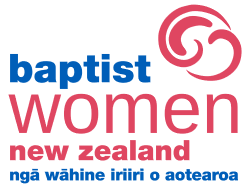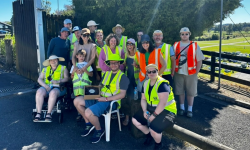
This occasional weekend column called ‘Pondering:…’ is where people from within the 'Team of 40,000 Baptists' can share issues they are thinking about, in a way that opens up a topic from a particular perspective. Feel free to comment on these pieces or contribute your own pondering. Opinion pieces are the views of individuals and need to be considered within the context of the diversity of our union of Baptist churches in New Zealand. When commenting or contributing please follow our Guidelines for articles, opinion pieces and online comments.
This pondering below comes from Julie Osborn, sole pastor at Connect Baptist Church in Manukau, graduate of our Pastoral Leadership training at Carey Baptist College.
The intention of sharing my opinion within this ‘Pondering’ column is to help us to look honestly at how we decide on leadership in our New Zealand Baptist churches.
As sole pastor, for over a decade now, of a Baptist Church in Manukau, Auckland, I have faced challenges. Some challenges are unique to our specific location, some due to being single and/or female, whilst others will be familiar to all in pastoral leadership.
Since our church began in 1986, we have only ever been a maximum of 140 congregants. When I started in 2013, the church sat at around eighty. By 2017, it had grown to 107. Following three years of the COVID-19 pandemic and all its related challenges, we dropped to a home group size of thirty. I thought my years in ministry had ended and really blamed myself for this “failure.” But through all of this, I felt God telling me to keep going through the storms and push through. Now we are starting to rebuild, numbers are growing again, and so is the faith of those who call this church home.
At the end of 2020, I had nearly burnt out, and I now realise how hard I had been trying to prove myself as a single woman in senior pastoral ministry. This was not a conscious thing, but when we only have a handful of female senior or sole Baptist pastoral leaders scattered throughout the nation, I believe there is a much bigger problem that needs addressing.
Monique Lee (Lead Pastor at Manurewa Baptist Church), Rachel Roche (Kaitiaki Regional Advisor, Northern Baptist Association), and I did some interviews two years ago with women leaders who have left our movement of churches. Charles Hewlett, our National Leader, requested this research. I am very appreciative of Charles, who humbly met these women in person to apologise on behalf of New Zealand Baptists, acknowledging that their offences were real. Several female Baptist Pastors have left our New Zealand Baptist churches because of poor processes of conflict resolution that in the past have often favoured our male senior pastors.
While we have improved in recent years in appointing women to pastoral leadership roles, there remains only a handful of women throughout our movement in senior or sole positions who do not co-lead with a male counterpart. I have always wondered what the “real” reason is. Then Rachel gave me an interesting article to read that resonated with me. “Uncovering and dismantling barriers for women pastors,” written by Heather Matthews, published in Priscilla Papers (Winter 2022). In North American egalitarian evangelical churches, just like in our New Zealand Baptist Churches, there are few women senior or sole pastors. In both nations, most mainline denominations ordain female clergy. So why do so many female pastors continue to encounter what the article refers to as the “stain-glass ceiling”? (Reference the “glass ceiling” for women in management in secular occupations.) Why do they still lack opportunities for senior or sole pastoral roles?
Heather’s research revealed that although the percentage of women clergy in the United States of America rose from 6% in 1980 to 20% in 2016, women still lead few American congregations. Since 1998, the percentage of congregations led by women has not increased. Here in New Zealand, Charles Hewlett, in conjunction with Carey Baptist College staff, has done some important work in recent years to change this pattern. Despite this, there are still so few of us Baptist women in senior pastoral leadership roles. In the American study, in 2012, women served as senior or sole pastors in only 11% of congregations. Our Baptist movement percentages in New Zealand are comparably low, sitting in 2017 at 7.7% (there were 18 female senior/sole/co-pastors across 234 Baptist churches).
In Heather’s study, it appeared that most male clergy did not understand or address barriers for women in leadership and that evangelicalism was intertwined with complementarianism.
Evangelicalism is a global movement nearly three centuries old within Protestant Christianity in which most New Zealand Baptists would be situated. You could probably say our New Zealand Baptist Articles of Faith generally make us Evangelical.
Complementarianism is a theological view that men and women have different but complementary roles and responsibilities in marriage, family life, religious leadership, etc. Therefore, some leadership roles are gender-specific within a complementarian view. An alternative theological view to this is referred to as Egalitarianism, which affirms gender equality and equal responsibilities within the family and in religious leadership. While these two views can both be considered ‘biblical’, New Zealand Baptists have been affirming equality in leadership between men and women for more than four decades – see the various statements here: baptist.nz/women-in-leadership
Getting back to Heather’s study: While supporting female leadership in policy, this did not follow through to practice. Of all the pastoral leaders surveyed, only 21% were female.
So, here is my question. When it comes to the crunch, how many of our male Baptist senior pastors would support a female leader taking their place in the future? I think we would be surprised, including male leaders, if they really thought about this with brutal honesty. I wonder if some of our senior male Baptist pastors, while happily employing female pastors and staff on their team, would not be happy with a female senior pastor or a female chair of the Elders. What do you think? I personally believe we have such a long way to go in our New Zealand Baptist movement of churches before equity in senior leadership is achieved.
My risk in authoring this article is that I will be labelled a feminist, which has the connotation still of being “anti-male.” - That I am not. I love the male leaders in my Baptist pastor cluster and fully support them in ministry. However, there remains a great need for change within our movement of churches for our practice to match our affirmation, and Heather’s American study has shed further light on this for me. In terms of preaching, 94% of churches surveyed only had female preachers a few times a year. How tragic is that?
So, here are a few questions that demand honesty: Are our senior pastors, either male or female, as gatekeepers to the pulpit consciously or unconsciously making decisions with a gender bias rather than ability? Is patriarchy still strong in our New Zealand Baptist congregations?
Heather’s research found that gender stereotypes arose out of theological beliefs and historical practices of the church. So, how do we change this within our New Zealand Baptist churches? In my nearly 11 years as a sole pastor, I have appreciated the change at our annual National Hui to a more balanced view of male and female voices instead of mostly men. Keep it up, Assembly Council, until we can maintain true equity.
In terms of equity, eldership has a huge say and sway when it comes to calling and employing pastors. Who is on your church’s eldership team? How is the gender balance? In Heather’s study of American evangelical church eldership boards, only 22% of elders were female. I doubt many of our New Zealand eldership teams would reach even that! So, how can we educate our eldership teams and elder selection processes?
In my theology, Christ created males and females equal (Gen 1:27-28), and they will be equal at the Second Coming of Christ. Christ Himself sought to empower women through the Gospels amidst a patriarchal society. The Apostle Paul followed this example as he established many of the early churches. How stuck are we in gender stereotypes passed down through the generations based on societal norms rather than biblical ones?
In Heather’s study, several women mentioned a lack of mentoring in the workplace, perhaps because of policies surrounding interactions between men and women. How many women in our movement of churches are unable to “shadow” senior pastors in their work environment because it is deemed “inappropriate”? In starting my role 10.5 years ago, I was told that I could only meet the chairman of the elders in a café and not in my office for fear of “congregant’s view of inappropriate behaviour”. Males seeking senior positions do not face this issue. So, how can we address this going forward?
In Heather’s study, few male pastors could see that their church leadership structures and policies hindered women from seeking leadership roles, preferring to externalise the problem to “tradition” or “culture.” Do your church leadership structures and policies favour a particular gender? If culture is the problem, are leaders actively working to change that? In Heather’s study, sexuality was a barrier. 81% of men described set policies for interactions with women, such as only meeting in public spaces like cafés. The assumption is that men might face false accusations or temptation. None of the men believed these rules impacted their work, whilst 79% of women said that they impacted theirs. I suggest that our New Zealand Baptist statistics are likely to be similar.
Heather found that pornography use was equally prevalent among male pastors as in the general population. Perhaps as a movement of churches, we could address the issue of pornography among pastoral leaders as an issue of greater impact. It would really help up-and-coming women leaders if they could “shadow” their senior pastors to gain experience.
So how can our Baptist male senior pastors support women leaders?
>> They can actively pursue a more even gender balance on teams, as pastors, elders, ministry leaders, and admin, where selection is based on fitness for the role rather than gender.
>> Learn to mentor female leaders well.
>> Have flexible working hours for working mums.
>> Teach gender equality and equity in sermons at least once a year.
>> Share the pulpit with female preachers.
>> Teach correct theology!
Heather’s research found that many American evangelical churches took a “soft complementarianism stance,” allowing women some leadership and freedom while maintaining men in senior power roles.
>> Develop and enforce clear policies and procedures that address barriers for women in leadership. Be accountable for the progress made or not made, the speed of change, and the stability of the new policies.
>> Men with power must act. We need male sponsors and mentors who are senior leaders. Our congregations will listen to you. The more that women senior leaders speak up, the more they will be labelled feminists and troublemakers, be marginalised, and their voices go unheard.
>> Change must be comprehensive and accelerated. This must be intentional through the Assembly Council, our Associations, our local churches (aka the whole Baptist Union), and at our various Hui.
I thank you for reading my thoughts, whether you are a male or female in our Baptist movement of faith communities. My prayer is that all take the discussion points included seriously. Have intentional conversations, make decisions, and take actions as they apply to your situation. Above all, we can support and pray for all our leaders, especially those who feel undervalued and marginalised.
I am happy to receive your feedback, as I wish the absolute best for our Baptist movement in the coming years. My email is [email protected]
Read other contributions to our Pondering... column here.
Reference
Heather Matthews is the Doctor of Ministry Program Manager and Coordinator of Partnership and Academic Advising at Wheaton College Graduate School’s School of Mission, Ministry, and leadership. Her article was published in Priscilla Papers (Winter 2022). https://www.cbeinternational.org/wp-content/uploads/2022/09/PP361Web.pdf
Photo: supplied by Julie Osborn



